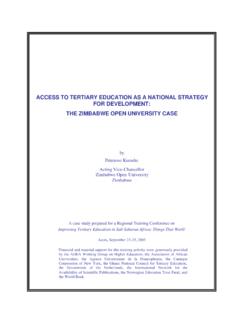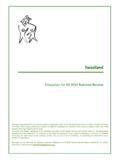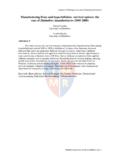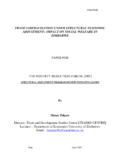Transcription of Tobacco industry and corporate responsibilityan inheren…
1 Tobacco industry and corporate inherent contradiction February 2003 THIS DOCUMENT HAS BEEN DEVELOPED BY THE POLICY ANALYSIS AND COMMUNICATIONS TEAM OF WHO S Tobacco FREE INITIATIVE, PURSUANT TO WHA RESOLUTION , TRANSPARENCY IN Tobacco CONTROL PROCESS, THAT ''CALLS ON WHO TO CONTINUE TO INFORM MEMBER STATES ON ACTIVITIES OF THE Tobacco industry THAT HAVE NEGATIVE IMPACT ON Tobacco CONTROL EFFORTS.'' Tobacco FREE INITIATIVE world health organization Tobacco industry and corporate inherent contradiction world health organization February 2003 2 Tobacco industry and corporate inherent contradiction world health organization February 2003 Increasingly consumers, employees and managers expect companies, particularly large multinationals, to go beyond their traditional role of creating, producing, packaging and selling for a profit. In the public s view, job creation and tax paying no longer suffice as private sector s sole contribution to society.
2 The boom of socially responsible investment (SRI) products attest to this trend as investors express their concerns and make their social and ethical stands known to the companies they invest in and patronize. Socially responsible investors include individuals, corporations, universities, hospitals, foundations, and insurance companies, pension funds, non-profit organizations, churches and synagogues. Funds may exclude certain products or practices such as alcohol, weapons, pollution, animal testing or gambling; or they may seek to actively identify positive aspects of companies that adopt sound policies for environmental protection, fair employment practices, community and labor relations, for example. The common denominator among the vast majority of ethical or socially responsible investment policies and products is the exclusion of Tobacco companies in their portfolios.
3 I Well-planned and well-managed philanthropy, from sponsoring music, film and art festivals to creating education programs for the disadvantaged to protecting the environment, in the name of corporate social responsibility (CSR) has become a necessary element in virtually every large corporation s business plan. Many businesses from a wide range of sectors conduct projects and programmes that aim to reduce social inequity by creating or improving health care or educational facilities, providing vocational and management training, enhancing the quality of leisure and cultural activities. Specific sectors are recognizing their responsibilities and orient their CSR efforts to areas especially relevant to their business. For example, food and beverage multinationals have specific responsibilities in terms of product marketing, consumers changing eating habits, and conditions under which agricultural commodities are produced and traded.
4 Transport companies must contend with the environmental impact of their business as well as traffic congestion, energy waste, safety and security and access to trade and enterprise opportunities. Tobacco companies have not missed this trend. Major companies have developed programmes for small business development in Kenya, crime prevention in South Africa, business education in China, folk culture preservation in Venezuela, and medical treatment and flood relief in Pakistan. A few specific examples follow. youth smoking prevention One area where nearly every major Tobacco company invests publicity efforts to improve their corporate image is the development and promotion of ineffective youth smoking prevention programmes. While these programmes are created to appear to dissuade or prevent young people from smoking, in fact the effect is often the contrary.
5 By portraying smoking as an adult activity, these programmes increase the appeal of cigarettes for adolescents. Proposed measures that involve proof of age for purchase at the counter are ultimately ineffective, as young people easily circumvent these restrictions. Tactically, these programmes serve the purpose of creating the appearance that Tobacco companies are proposing solutions for the problems they create. In reality, they detract attention from Tobacco industry and corporate inherent contradiction world health organization February 2003 3 proven, effective solutions including price and tax increases to which young people are particularly sensitive. Tobacco companies vigorously oppose price and tax increases. education Another field where several Tobacco companies have focused their CSR activities is education, often in the form of grants, scholarships, professorships, even the creation of an entire school.
6 At the end of 2000, the University of Nottingham announced the creation of the UK s first International Centre for corporate Social Responsibility, thanks to a million from BAT The centre s mandate is to study the social and environmental responsibilities of multi-national companies to the communities in which they operate. In December 2002, the Centre launched its new MBA programme, focusing specifically on CSR issues. Of course, many scholarships are available for this programme. A study recently published in the British Medical Journal details research grants and donations from the Tobacco industry as well as senior university governance appointments held by Tobacco industry officials. Of 90 universities and 16 medical faculties, 39% had received donations from the Tobacco industry . Four of the 16 medical schools had received research grants. Tobacco industry officers and directors were found to hold 26 university related appointments between 1996 and 2001, including posts such as governor, president, chancellor, and director, as wells posts in university affiliated teaching hospitals and in university development and advancement.
7 Dr Fernand Turcotte, of Laval University, one of the study s authors, said such appointments were scandalous. The Tobacco industry infiltrates the universities in this way because of the prestige associated with these institutions. He added it s a way to buy silence and complacency"ii At the end of 2002, BAT-Ghana contributed 250 Ghanian Cedi (approximately 30,000 USD) to the University of Ghana, Legon. for the Jubilee Hall Fund; and to the Kwame Nkrumah University of Science and Technology, Kumasi, for the establishment of Research Chair in Agro-Forest at the Institute of Renewable Natural Resources. The company also sponsors 44 tertiary students each A less successful attempt to buy academic credibility was BAT s attempt to offer a London School of Hygiene and Tropical Medicine student a 1500 grant as well as the opportunity to work in the company s research and development unit at its Southampton factory on completion of the degree.
8 Professor David Leon, upon learning of the offer told the company to take its money elsewhere. He replied to the company: "You must think that academics and students in epidemiology are both extremely stupid and mercenary. There is no need to recite to you the responsibility BAT has for millions of deaths as it continues to push Tobacco around the world ." iv development and other philanthropy The Tobacco industry is also involved in community-level development projects, such as the Kerio Trade Winds Project, in Kenya a partnership between the community and BAT that aims to develop[ing] Tobacco growing activities as an option towards alleviating poverty in line with the government s poverty alleviation strategy. v The Tobacco Association of Malawi has joined in ILO efforts to discourage abusive child labour practices in Tobacco farming in Souza Cruz, the Brazilian subsidiary of BAT, sponsored a concert tour to celebrate the 40 year career anniversary of an internationally-known Brazilian pianist in support of the newly elected Brazilian President s campaign to eliminate hunger, Fome Zero.
9 Vii These activities come less than a year after a Christian Aid investigation of the Brazilian subsidiary of BAT, Souza Cruz, exposed labour practices ranging from alleged price control abuses, to failure to protect workers from pesticides and other hazardous chemicals, to failure to improve conditions where children are forced to labour in Tobacco fields to help alleviate family Tobacco industry and corporate inherent contradiction world health organization February 2003 4 health Perhaps most remarkable, and most cynical, are those Tobacco industry -sponsored programmes that aspire to public health goals. For instance, BAT Bangladesh extended their support to Shandhani Andhatyamochan (Blindness Relief) Lottery organised by Shandhani National Eye Donation Society by purchasing a large quantity of lottery tickets and making a donation to the Shandhani National Eye Donation Society, handing over a cheque at a public ceremony held the BAT factory in No mention was made of the link between smoking and cataracts, a major cause of blindness.
10 The same factory was the venue for an occupational health workshop for students of Bangladesh In Zimbabwe, BAT recently invested $6 million in a Harare medical clinic for the company s 400 factory workers. A local paper reported, The British American Tobacco Company Zimbabwe should therefore be commended for focusing on the health and well being of its employees xi CSR alternative? In an interesting move, Philip Morris, the world s largest Tobacco company, started the new year with a new name, Altria, reportedly inspired by the Latin altus, high. In contrast to the company s own explanation of the corporate identity change that reflects important evolutions in [the company s] development, this name change has been hotly criticized as a PR move to distance other Philip Morris companies from the spectre of Tobacco . Philip Morris is banking on the short memory span of consumers and hoping that yet another massive PR campaign will win back a US public that has adamantly rejected its deadly business practices.

















